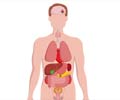Epigenetic changes removed the blocking mechanism of a protein complex long known for gene suppression, and transitioned the complex to a gene activating role instead.
Epigenetic changes can activate or repress genes involved in autism spectrum disorders (ASDs) and early brain development, according to biochemists at NYU Langone Medical Center. Mice studies and laboratory experiments have revealed that epigenetic changes removed the blocking mechanism of a protein complex long known for gene suppression, and transitioned the complex to a gene activating role instead.
Researchers showed that autism susceptibility candidate gene 2 (AUTS2) converts polycomb repressive complex 1 (PRC1), one of a group of proteins involved in transcriptional regulation during development, to a gene-activating role, during which it prevents a chemical modification change to histone H2A, a main DNA-packaging protein in all cells with a nucleus. AUTS2 proteins are dominant in the cortex region of the brain, the part of the brain involved in memory, attention, and learning, and were more present in the first few weeks of life than adulthood. It was found that disruption in the function of AUTS2 in mice led to behaviors that were comparable to the neurologically delayed autistic behaviors observed in people. It is already known that nearly half of all people with AUTS2 mutations have been diagnosed with some form of the syndrome.
Senior study investigator Danny Reinberg, PhD, a professor at NYU School of Medicine and a Howard Hughes Medical Institute investigator said, “Our findings offer strong supporting evidence that if ASDs can be tied to widespread disruption of gene networks from multiple genetic lesions, then finding potential therapies could rest on research into repairing these gene network interruptions."
The research team plans further study of AUTS2 and its activities in other parts of the brain to uncover other possible links to ASDs or other neurological conditions, such as attention deficit hyperactivity disorder (ADHD) and schizophrenia.
The study is published in the journal ‘Nature’.
Source-Medindia
















